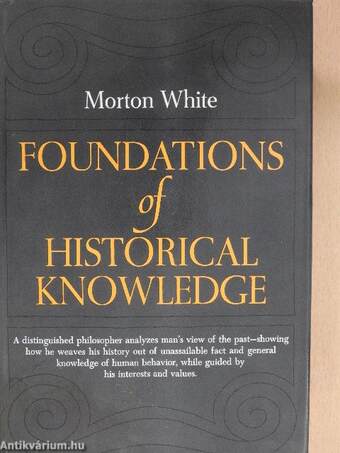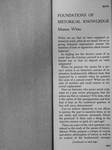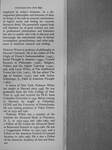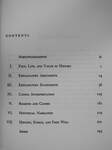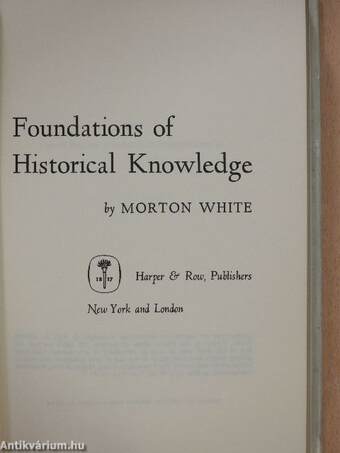1.063.236
kiadvánnyal nyújtjuk Magyarország legnagyobb antikvár könyv-kínálatát

VISSZA
A TETEJÉRE
JAVASLATOKÉszre-
vételek
Foundations of Historical Knowledge
| Kiadó: | Harper & Row Publishers, Inc. |
|---|---|
| Kiadás helye: | New York |
| Kiadás éve: | |
| Kötés típusa: | Vászon |
| Oldalszám: | 299 oldal |
| Sorozatcím: | |
| Kötetszám: | |
| Nyelv: | Angol |
| Méret: | 22 cm x 15 cm |
| ISBN: | |
naponta értesítjük a beérkező friss
kiadványokról
naponta értesítjük a beérkező friss
kiadványokról
Fülszöveg
$6.95
FOUNDATIONS OF HISTORICAL KNOWLEDGE
Morton White
When we say that we have explained an historical event, what do we mean? Do we in giving historical explanations assume the existence of laws or regularities about humán behavior?
In singling out the decisive cause of an event does the histórián proceed in a purely factual way or does he depend on value judgments?
When he presents the reason for a per-son's action is an historian's process of ex-planation fundamentally different from that employed by a scientist when he presents the cause of a natural event? What are the roles of statistics and social science in historical explanation?
Does an histórián who passes morál judg-ment on a past action presuppose that the action was free or voluntary? If he does, what is the nature of this presupposition and how does it bear on the traditional question of free will versus determinism?
Can we achieve objectivity in our efforts to portray the past in narrative form, or do our... Tovább
Fülszöveg
$6.95
FOUNDATIONS OF HISTORICAL KNOWLEDGE
Morton White
When we say that we have explained an historical event, what do we mean? Do we in giving historical explanations assume the existence of laws or regularities about humán behavior?
In singling out the decisive cause of an event does the histórián proceed in a purely factual way or does he depend on value judgments?
When he presents the reason for a per-son's action is an historian's process of ex-planation fundamentally different from that employed by a scientist when he presents the cause of a natural event? What are the roles of statistics and social science in historical explanation?
Does an histórián who passes morál judg-ment on a past action presuppose that the action was free or voluntary? If he does, what is the nature of this presupposition and how does it bear on the traditional question of free will versus determinism?
Can we achieve objectivity in our efforts to portray the past in narrative form, or do our values and interests necessarily distort the portrayal? Is there such a thing as the objective essence or spirit of a past age?
These are somé of the vitai questions con-sidered in this study of the nature of history. Morton White presents a critique of certain speculative philosophies of history as well as an analysis of the fundamental concepts
employed by today's histórián. As a dis-tinguished philosopher and histórián of ideas he brings to his task an unusual combination of logical acuity and feeling for concrete historical detail. His powerfully argued book will therefore be of great interest not only to professional philosophers and historians but alsó to readers who wish to discover and disentangle the intertwined roles of factual investigation, generalization, and value judg-ment in historical research and writing.
Morton White is professor of philosophy at Harvard University. He is the author of The Origin of Dewey's Instrumentálisra (1943), Social Thought in America (1949), Toward Reunion in Philosophy (1956), Religion, Politics and the Higher Learning (1959), and, with Lucia White, of The Intellectual Versus the City (1962). He has edited The Age of Analysis (1955) and, with Arthur Schlesinger, Jr., Paths of American Thought (1963).
A native of New York, Professor White has taught at Harvard since 1948. He was graduated from the City College of New York in 1936 and received his Ph.D. from Columbia University in 1942. Before coming to Harvard, he taught at Columbia, CCNY and the University of Pennsylvania. He was visiting professor at Tokyo University in 1952 and 1960.
Professor White was a member of the Institute for Advanced Study in Princeton, N. ]., in 1953-1954 and 1962-1963; and a Fellow of the Center for Advanced Study in Behavorial Sciences in 1959-1960. He was a Guggenheim Fellow in 1950-1951 and a Fellow of the American Council of Learned Societies in 1962-1963. He is alsó a Fellow of the American Academy of Arts and Sciences. Vissza
Témakörök
- Filozófia > A szerző származása szerint > Amerikai
- Idegennyelv > Idegennyelvű könyvek > Angol > Filozófia > Nemzetisége szerint > Amerikai
- Idegennyelv > Idegennyelvű könyvek > Angol > Történelem > Egyéb
- Filozófia > Témaköre szerint > Tanulmányok, esszék
- Filozófia > Témaköre szerint > Szakfilozófiák
- Idegennyelv > Idegennyelvű könyvek > Angol > Filozófia > Témaköre szerint > Tanulmányok, esszék
- Idegennyelv > Idegennyelvű könyvek > Angol > Filozófia > Témaköre szerint > Szakfilozófiák
- Történelem > Idegennyelvű > Angol
- Történelem > Egyéb
Morton White
Morton White műveinek az Antikvarium.hu-n kapható vagy előjegyezhető listáját itt tekintheti meg: Morton White könyvek, művekMegvásárolható példányok
Nincs megvásárolható példány
A könyv összes megrendelhető példánya elfogyott. Ha kívánja, előjegyezheti a könyvet, és amint a könyv egy újabb példánya elérhető lesz, értesítjük.



